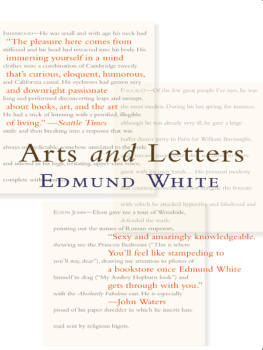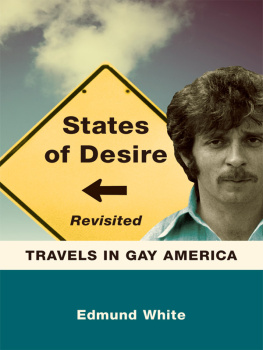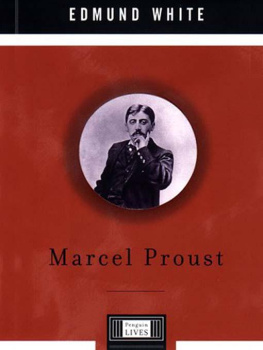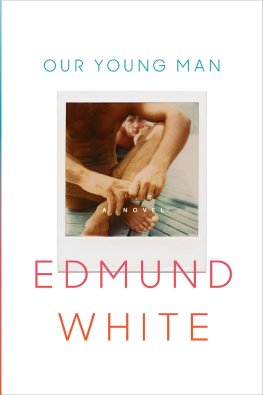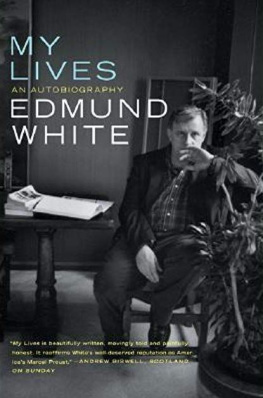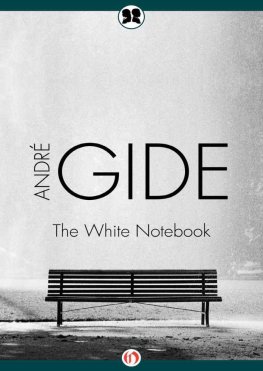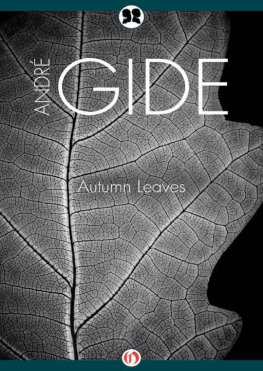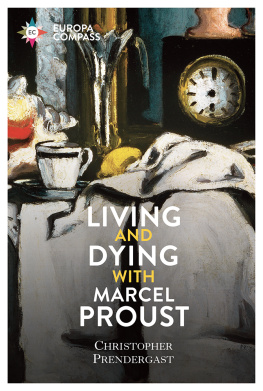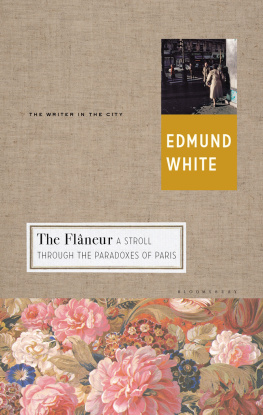Copyright 2004 by Edmund White.
All rights reserved. Except for brief passages quoted in newspaper, magazine, radio, or television reviews, no part of this book may be reproduced in any form or by any means, electronic or mechanical, including photocopying or recording, or by information storage or retrieval system, without permission in writing from the Publisher.
Published in the United States by Cleis Press Inc., P.O. Box 14684, San Francisco, California 94114.
Printed in the United States.
Cover design: Scott Idleman
Cover photograph: Marion Ettlinger
Book design: Karen Quigg
Cleis Press logo art: Juana Alicia
First Edition.
10 9 8 7 6 5 4 3 2
List of previously published works appear on page 361.
Troy Hill.
Introduction:
Members of the Clan and Fellow Travelers
ANY COLLECTION OF ESSAYS reflects the assignments one has received from various newspapers and journals as much as it reveals abiding preoccupations. Ive been lucky in the last two decades that Ive been free to pick and choose among the book reviews and profiles that have been proposed to me. Certainly no artist or writer discussed in this book has failed to engage my sympathies, and a handful (Nabokov, Merrill, Proust, Isherwood, Genet) have been icons throughout my creative life.
A novelist inevitably has a strategic relationship to anyone he writes an essay about. I am drawn to a writer or photographer or painter because he or she actually was or is a friend and belonged to the same clan (Dowell, Rorem, Foucault, Chatwin, Brainard, Isherwood, Mapplethorpe) or because they count as inspiring antecedents (Proust, Nabokov, Gide, Genet, George Eliot). Ive always been intrigued by unjustly forgotten writers (Bunin, Hamsun, Robbe-Grillet) and have written to bring their names back before the public, if only for an instant.
There are three general essays in this book: one on the historical novel (a subject that interested me when I was writing my own first historical novel, Fanny: A Fiction), another an autobiographical overview of my career as a gay novelist and biographer, and finally a piece on bisexuality prompted by a reading of Marjorie Garbers influential Vice Versa:Bisexuality and the Eroticism of Everyday Life.
Of course most of the essays in this book are about gay men, since Ive often been asked to comment on their workand Ive just as naturally felt unusually moved by men like me and their creative achievement. Not all the people in this book are on easy terms with their sexuality and as a consequence Ive not always dwelled on it. Others, such as Deneuve, Nabokov, Bunin, Hamsun, Paley, Rebecca Horn and Duchamp, are or were famously straight. Nobodys perfect.
I have rewritten these essays to a greater or lesser extent in preparing them for this collection. Sometimes Ive taken bits from three different pieces on Paul Bowles and fashioned a new essay; at other junctures Ive not so much updated a portrait as removed from it distractingly dated references. Since Ive devoted a long biography to Genet and a short one to Proust, I make no apology for the slightness of these essays about them. Yves Saint Laurent, David Geffen, Catherine Deneuve, and Elton John Ive listed as Personalities since they are colorful and significant cultural icons or forces but they cant be snuck into the rubrics Letters or Arts.
I would like to thank Patricia Willis at the Beinecke Library of Yale University for unearthing some of these articles and essays from my archives there. Frdrique Delacoste and Felice Newman have helped immensely to see these pages into print at Cleis Press. I want to thank Donald Weise for conceiving of this collection in the first place.
Edmund White
LETTERS
Writing Gay
SOME FORTY YEARS AGO I won a college literary award for a play Id written that was called The Blueboy in Black. The prize money I spent buying cases of a terrible sweet fizzy Italian wine named Asti Spumante, which I considered wildly elegant. Though the award money was quickly dissipated, my name and the name of my play were announced in the New York Times, which led to an agent contacting me. Through her a production was arranged and two years later my play, starring the black actors Cicely Tyson and Billy Dee Williams, opened off-Broadway. The play, partly because at the time I was out-of-touch with the newest trends, was a bit dmod, a recycling of the Theatre of the Absurd and Jean Genets The Blacks, and I was criticized for being dated. Worse, in 1964 we were at the height of the Civil Rights Movement when the race problem was supposed to have been solved, but I was showing angry blacks on stage who were taking revenge on their white employers. The critic for the Times, Bosley Crowther, said, Negroes in America have enough problems without Mr. White. The most positive review, by Alan Pryce-Jones in Theatre Arts, called it one of the two best plays of the year. But when I met Mr. Pryce-Jones twenty years later (and this is the Proustian part) and thanked him for his kindness, he had no recollection of my play.
The play was not only about race but also about homosexuality. When my ultraconservative Republican father came to the opening night with a business associate he asked me privately, Whats it aboutthe usual?, which was his way of referring to a gay theme. I had to confess that it was a little bit about the usual. Of course for him discussion of race was almost as offensive, so it must have made for a rather uncomfortable evening.
When I was a junior at the University of Michigan I had won a somewhat smaller award for a collection of short stories, and there again the usual had been a recurring theme at a time when almost no gay literature existedand when even the very term was unknown. To be sure, Baldwin had recently published a despairing homosexual-themed novel, his beautiful book Giovannis Room, and Gore Vidal and Paul Bowles and Tennessee Williams were all experimenting with short gay fiction, much of it extremely deft and sophisticated, but none of them became celebrated or successful for their gay fiction. They all had to go on to quite different work in order to achieve their immense fame.
I suppose I never had much of a choice. For some reason I had a burning need to explore my own gay identity in fiction. Id written my first gay novel when I was just fifteen and a boarding student at Cranbrook boys school in Bloomfield Hills, outside Detroit. Since I didnt play sports I had the long afternoons in which to do my homework and then the official two-hour enforced study hall in the evenings to work on my novel, which I called The Tower Window. It was all about a boy much like myself who turns to an adult man, a handsome Mexican, because hes been rejected by a girl his own age. I had a highly developed fantasy that I would sell this novel and make a fortune, which would allow me to escape my dependence on my parentsbut even though my mothers secretary typed it up for me I never got around to sending it off. Perhaps I didnt know where to send it.

